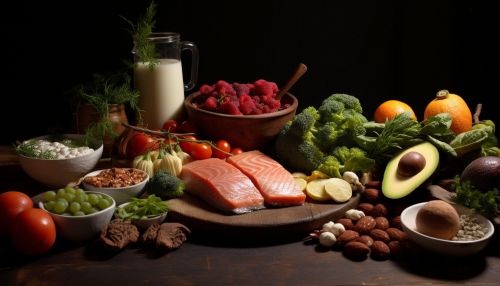Nutrient
Introduction
Nutrients are the substances in food that organisms need to live and grow. They are the source of energy, or calories, and the raw materials for growth, repair, and maintenance of body tissues. Nutrients also regulate body processes and maintain overall health. There are six major classes of nutrients: carbohydrates, fats, proteins, vitamins, minerals, and water. All these nutrients are essential, meaning they must be obtained from the diet because the body cannot produce them in sufficient amounts on its own read more.
Classification of Nutrients
Nutrients are classified into two broad categories: macronutrients and micronutrients. Macronutrients are needed in large amounts and include carbohydrates, fats, and proteins. Micronutrients are needed in smaller amounts and include vitamins and minerals. Water, while not classified as a macronutrient or micronutrient, is also an essential nutrient.
Macronutrients


Macronutrients are the main source of energy for the body. They are required in large amounts in the diet and are measured in grams.
Carbohydrates
Carbohydrates are the body's primary source of energy. They are made up of sugar molecules, which are broken down into glucose during digestion. Glucose is used by the body's cells for energy and is particularly important for brain function. There are two main types of carbohydrates: simple and complex. Simple carbohydrates, or sugars, provide quick energy but can lead to a crash later. Complex carbohydrates, or starches, provide sustained energy read more.
Fats
Fats are a concentrated source of energy, providing more than twice as much energy per gram as carbohydrates or proteins. They are made up of fatty acids and glycerol. Fats are necessary for the absorption of fat-soluble vitamins (A, D, E, and K), for the production of hormones, and for insulation and protection of organs. There are different types of fats, including saturated, unsaturated, and trans fats, each with different health effects read more.
Proteins
Proteins are made up of amino acids, which are the building blocks of the body. They are necessary for growth and repair of tissues, for the production of enzymes and hormones, and for immune function. There are 20 different amino acids, nine of which are essential and must be obtained from the diet. Proteins can be found in both animal and plant foods read more.
Micronutrients


Micronutrients are needed in smaller amounts than macronutrients, but they are still essential for health. They include vitamins and minerals.
Vitamins
Vitamins are organic compounds that are necessary for normal growth and development. They are involved in a variety of bodily functions, including metabolism, immune function, and nerve function. There are 13 essential vitamins, which are divided into two categories: fat-soluble and water-soluble. Fat-soluble vitamins are stored in the body's fat tissues, while water-soluble vitamins are not stored and must be consumed regularly read more.
Minerals
Minerals are inorganic substances that are necessary for a variety of bodily functions, including bone health, muscle function, and nerve function. There are 16 essential minerals, which are divided into two categories: major minerals and trace minerals. Major minerals are needed in larger amounts than trace minerals, but both are equally important for health read more.
Water
Water is often overlooked as a nutrient, but it is essential for life. It is involved in nearly every bodily function, including digestion, absorption, circulation, and excretion. It also helps regulate body temperature and is necessary for the function of all cells, tissues, and organs read more.
Nutrient Deficiencies and Overconsumption
Both nutrient deficiencies and overconsumption can lead to health problems. Deficiencies can result in a variety of health problems, depending on the nutrient. Overconsumption, particularly of certain macronutrients, can lead to obesity and other health problems.
Nutrient Deficiencies
Nutrient deficiencies occur when the body does not get enough of a certain nutrient. This can result in a variety of health problems, depending on the nutrient. For example, a deficiency in vitamin D can lead to rickets, a disease characterized by soft, weak bones. A deficiency in iron can lead to anemia, a condition characterized by a lack of healthy red blood cells read more.
Nutrient Overconsumption
Just as the body can suffer from not getting enough of a certain nutrient, it can also suffer from getting too much. Overconsumption of nutrients, particularly macronutrients, can lead to a variety of health problems. For example, overconsumption of fats can lead to obesity and heart disease, while overconsumption of proteins can lead to kidney damage read more.
